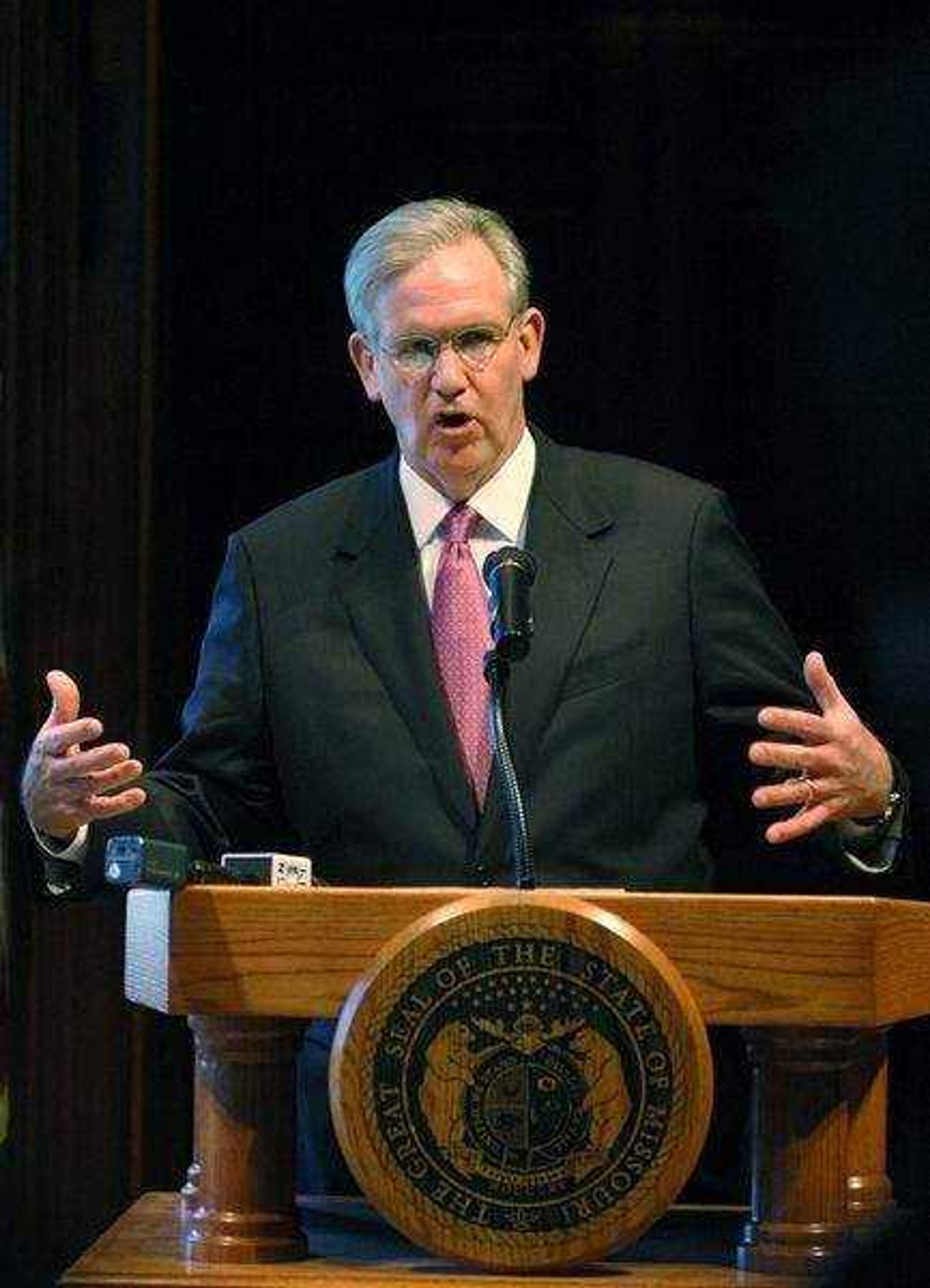Mo. gov. seeks university tuition freeze
COLUMBIA, Mo. (AP) — Missouri's public universities have struck a deal with Gov. Jay Nixon: They'll stop raising tuition if lawmakers spare them from the recession-driven budget cuts likely to hammer the rest of state government. Nixon touted his agreement Wednesday at the University of Missouri's flagship campus, followed by scheduled stops at Harris-Stowe State University in St. Louis and the University of Missouri-Kansas City...
COLUMBIA, Mo. (AP) — Missouri's public universities have struck a deal with Gov. Jay Nixon: They'll stop raising tuition if lawmakers spare them from the recession-driven budget cuts likely to hammer the rest of state government.
Nixon touted his agreement Wednesday at the University of Missouri's flagship campus, followed by scheduled stops at Harris-Stowe State University in St. Louis and the University of Missouri-Kansas City.
Tuition at state colleges and universities has increased every year for at least the past decade. At the same time, Missouri's per-capita spending on higher education hovers near the bottom, ranking 47th among the 50 states.
"For the first time in a long time, the pool of money that goes to higher education is not the place we're going to go hunting for the cuts," he said.
The proposal by Nixon, a Democrat who took office last week, requires approval by the Republican-controlled Legislature.
His announcement received mixed reviews from Republican legislative leaders, who noted they don't yet have a consensus on how much revenue the state is projected to receive next fiscal year.
"Nobody wants to cut higher education, but I don't know if that's entirely possible, given the situation we face," said Senate President Pro Tem Charlie Shields, R-St. Joseph.
"When you promise one segment of the budget that you're immune from cuts, essentially I think you're telling the rest of the segments that you will be cut," Shields added.
Nixon acknowledged that such a promise could create more drastic budget cuts in other areas. The state faces a projected shortfall as high as $342 million by the close of the current fiscal year.
Nixon declined to offer details on what services could be trimmed to balance the state's budget, as required by the Missouri Constitution. Nixon said those details will emerge on Tuesday, when he unveils his budget proposal at his first State of the State address.
"Certainly there will be some other parts of government and services that have to feel a little of the pruning knife of the times," Nixon said. "But it's not higher education."
The policy announcement further cements Nixon's hope to make higher education a hallmark of his first year in office. On the campaign trail, Nixon outlined a $61 million plan to expand full-ride scholarships for community college graduates to transfer and earn four-year degrees.
Nixon said he remains committed to that proposal, which he dubbed the Missouri Promise.
University of Missouri system President Gary Forsee appeared with Nixon in support of the budget proposal. He called the move a "bold action," especially given the trend in other states, including California and Washington, to increase tuition and reduce support for higher education.
"In the kind of economic environment we're in, that's the exact opposite of what we need, which is to stimulate the economy with high-quality jobs and high-quality education," Forsee said.
Forsee said that Nixon's announcement will have no effect on a hiring freeze implemented in November at the four system campuses in Rolla, St. Louis, Columbia and Kansas City.
In December, House and Senate budget leaders asked all state entities to come up with worst-case scenarios for dealing with budget cuts of 15 percent to 25 percent. Public colleges and universities warned that such cuts could force faculty layoffs, the elimination of courses and larger class sizes.
Senate Appropriations Committee Chairman Gary Nodler said Wednesday that he wasn't involved in the agreement between Nixon and higher education institutions, but added that he's encouraged to hear about it.
"I can't say with certainty that we can avoid cuts, but that's certainly a goal worth pursuing," said Nodler, R-Joplin.
State colleges and universities have struggled with what they consider inadequate support from Jefferson City since at least 2002, when state budget cuts led to tuition increases of at least 10 percent at all but one of Missouri's 13 four-year institutions.
At the University of Missouri-Columbia, tuition during the 1999-2000 school year was roughly $4,600 for a full-time student. Nearly a decade later, that amount has almost doubled to $8,500 annually.
———
Associated Press Writer David A. Lieb contributed to this report from Jefferson City.
Connect with the Southeast Missourian Newsroom:
For corrections to this story or other insights for the editor, click here. To submit a letter to the editor, click here. To learn about the Southeast Missourian’s AI Policy, click here.









